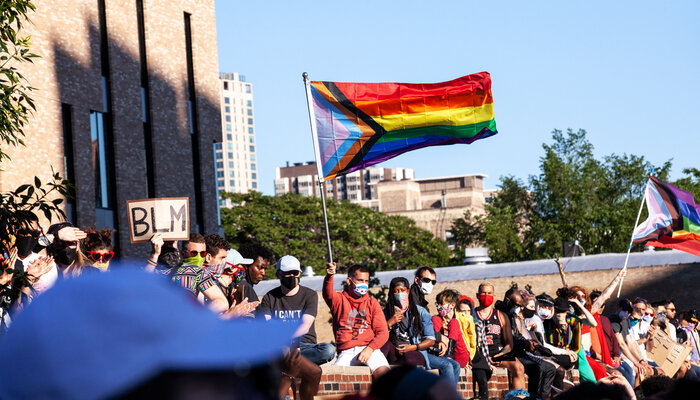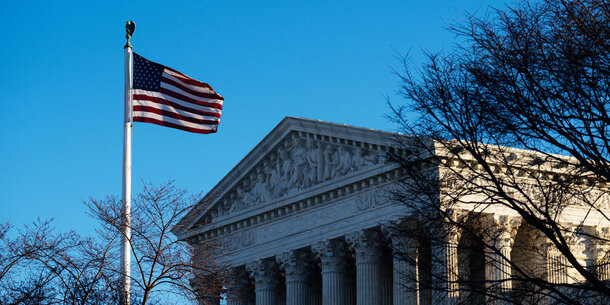We recognize Pride Month in June to commemorate the 1969 Stonewall Uprising against police brutality against gay and trans people in New York City. That fateful night — an inflection point for the LGBTQIA+ movement — was spurred primarily by the actions of transgender sex workers of color like Marsha P. Johnson and Sylvia Rivera, who purportedly threw the first shot glasses as police officers raided the Stonewall bar in Greenwich Village.
There have been great strides in the fight for equal rights since then, but more than a half-century later, police brutality, mass incarceration, and the quest for racial justice remain ever salient in our nation’s struggle to embody its stated principles of liberty and equality.
In a 1973 Supreme Court opinion, Justice William Brennan wrote, “If the constitutional conception of ‘equal protection of the laws’ means anything, it must, at the very least, mean that a bare congressional desire to harm a politically unpopular group cannot constitute a legitimate governmental interest.”
That same year, Rivera’s speech to a hostile, largely white crowd at a rally commemorating Christopher Street Liberation Day rings just as true today as it did then. Within moments of taking the stage, she launched into an impassioned plea for those incarcerated: “I’ve been trying to get up here all day, for your gay brothers and your gay sisters in jail, they write me every motherf---—g week asking for help, and y’all won’t do a goddamn thing to help them.”
Nearly 60 years later, LGBTQIA+ Pride continues to be rooted in protest. Yes, Pride is a celebration, but we can’t lose sight of the fact that protest is the reason for the season. The initial gatherings that we today view as the first Pride marches and rallies weren’t billed as such. They were explicitly agitating for gay liberation and gay power in response to police brutality. It was a subtle marketing strategy soon after to pivot the movement to that of pride in the hopes of appearing more agreeable to the broader cisgender and heterosexual public.
The criminalization and stigmatization of queerness is in large part still ongoing, with enforcement falling disproportionately on queer and trans communities of color. Marriage equality is the law of the land nationwide thanks to a landmark Supreme Court ruling, but statutory protections, particularly for trans people, are far off. We can’t rely on the courts alone to secure a future for the rights of gay and trans folks. There are signs of progress in some state legislatures. New York Gov. Andrew Cuomo is expected to sign sweeping legislation passed by the state assembly earlier this month that streamlines the process for trans folks to update their identity documents, doing away with archaic stipulations like requiring trans people to publish their chosen and deadnames in newspapers, and it enables non-binary New Yorkers to select a gender-neutral X gender marker on driver’s licenses and birth certificates.
However, conservative state legislatures are now leading an unprecedented assault on trans rights. The ACLU is tracking some 100 anti-trans bills that cover numerous facets of life. Some would restrict which restrooms trans people can use, while others would ban lifesaving, gender-affirming medical care for trans youth, despite the fact that such treatment is endorsed by a litany of major medical associations, and still more would restrict the ability of trans student athletes to compete in school sports.
These medical interventions, such as hormone blockers to prevent an undesired puberty, have been used with great success on cisgender people who experience puberty that begins too early. Given that identical medications are used commonly in cisgender populations, it’s impossible to come away from the introduction of these bills as anything other than attempts to codify animus against trans people into law. Furthermore, intersex individuals are routinely subjected to unnecessary and irreversible genital surgeries in infancy, where consent is impossible to attain, which underscores the lopsided application of lawmakers’ fears of irreversible genital surgeries forced upon misguided youth.
One such measure is Texas Senate Bill 1646, which sought to classify gender affirming care as “child abuse” and could empower Child Protective Services to take transgender children from parents who seek out recommended medical care. Thankfully, all 13 anti-transgender bills considered in the Texas Legislature died when the legislative session ended in May.
But other measures around the country have made it through, and they discriminate in various ways. Laws in Arkansas and Idaho could force trans adolescents already years into a medical care plan to flee their states or stop receiving care altogether. And a new law in Tennessee mandates that businesses post signage indicating that they allow transgender people to use the appropriate restroom that corresponds to their gender identity. Penalties include fines and up to six months imprisonment for business owners who flout this requirement. The goal of these laws is a clear attempt to further stigmatize an already vulnerable community.
It should also be stated that the brunt of enforcement of these laws won’t fall exclusively on trans people: be prepared for gender nonconforming cisgender individuals to be accosted and harassed by law enforcement, like butch cisgender lesbians who are forcibly removed from women’s restrooms for not appearing sufficiently feminine.
Commitment to equality before the law, individual rights, bodily autonomy, and freedom of expression and association are just a few bedrock principles that protect queerness and serve as a metric by which we must judge our public servants. Queer liberation is the logical conclusion of the equitable enforcement of the liberties enshrined in the Bill of Rights.
The United States was founded as a response to unchecked state power, and if we put our individual rights to a majority vote a lot of us would come out the other side with little to no freedom at all. This is especially true of a community that makes up less than 2 percent of the population. As such, we have a system, when it works as it should, that creates a protective zone around the individual to be free from the intrinsic animosity that so often results from unmitigated majority rule.
The Equality Act, a bill that would amend the 1964 Civil Rights Act to explicitly protect sexual orientation and gender identity, was passed by the House in February. But it is being held up in the Senate by the filibuster, which is also standing in the way of much needed voting rights protections and updates to election laws.
Against this backdrop, our criminal justice system seems designed to maximize suffering for the most marginalized caught in its gears. Trans women are frequently housed in male facilities and subsequently subjected to immense trauma in the form of misogynistic, transphobic, and sexual harassment by corrections officers and fellow incarcerated people alike. When trans women aren’t being traumatized by incarceration itself, they are often housed in solitary confinement as a form of “protection,” with deadly consequences.
Ultimately, queer liberation affects everyone. Ending mass incarceration is an issue of queer liberation. Reducing the number of interactions between law enforcement and the public is a matter of queer liberation. Ending solitary confinement is a matter of queer liberation. Repealing restrictive voter ID laws that can make it hard for trans people to vote is a matter of queer liberation. In the same ways these reforms are key to racial justice and equality, they too are key to queer justice and equality. Pursuing these reforms won’t just benefit members of the queer community but would result in greater freedom for society as a whole. Enforcement of every new law or regulation is inevitably borne by the most marginalized among us.
How a system of laws treats its most vulnerable groups is the best barometer to judge said political system. America has come a long way since Stonewall, but there is still a long way to go.


